What is the role of an internal Localization team in the era of AI?
Last Sunday, a spectacular sunny day broke out here, signaling that we're entering spring, so it was time for the season's first barbecue!
Preparing food outdoors while enjoying a beer as wood burns and getting the grill ready is a ritual I really enjoy.
There, chatting with friends and family, we catch up on each other's lives. There's something magical about being next to a fire; it's something embedded in my ancestral DNA,I guess … I genuinely like it, a lot! The only part I like less is when we enter "nostalgia mode."
My wife's father rarely misses an opportunity during these lively chats to say, "Everything's going downhill" or "Life used to be better before." I understand that someone who's 80 might think this way, but it's not true!
I try to hold back and avoid getting into a pointless argument; sometimes, I manage, but often, I don't.
It just doesn't make sense to say that life was better in his time! The healthcare system is better now, access to basic services is better, not to mention education. It's hard to find a progress indicator that supports the idea that life was better in the past.
The novelty in this chat, because this conversation of "life was better before" is nothing new, came this time from Artificial Intelligence! My father-in-law talking about AI is proof that AI has reached the mainstream. Of course, the news was delivered with the alarmist tone he usually has, claiming that 70% of jobs will be taken over by robots. Something he heard while watching the news on national TV.
And he said to me, Miguel, what will you do then? That "what are you going to do" is the central theme of my post this week.
What is the role of an internal Localization team in the era of AI?
Morgan Housel's book Same as Ever has a chapter precisely on this topic of optimism and pessimism, which I find to be an interesting reflection.
Morgan claims that an optimist thinks everything will turn out well and sees any negative thoughts as a flaw. Being hyper-optimistic is not a good life strategy, nor is being a pessimist, thinking everything will go wrong; that's not an ideal situation either. It's difficult to progress and achieve something in life if we are continuously surrounded by a halo of pessimism.
As in many cases, virtue lies in balance. The author proposes being a pessimist in the short term but an optimist in the long term. That is, being realistic that there will be tough times ahead, but everything will work out in the end. In the short term, this will serve to keep us alert, to continue improving, learning new things to stay relevant.
We tend to make fewer mistakes when we are alert than when we let go. So, at this moment of the AI explosion, it is a good time to be vigilant and learn, maybe suffer in the short term but to win in the long run.
So, going back to the question I intend to answer in this post about the role of an internal Localization team in the era of AI, I will reflect on areas where robots, as my father-in-law says, are not prepared to take our jobs, or better said, in which the robot (AI) is our ideal co-pilot (as Microsoft calls it, very apt name by the way).
Click HERE to download the infographic
- Everything culture-related: Humans are better at understanding and interpreting cultural nuances, subtleties, and context in language and behavior. This includes idioms, humor, and local customs that AI might misinterpret or overlook. Example: A localization specialist adjusting a marketing campaign to align with local customs and humor in Spain, ensuring that jokes are culturally appropriate and resonate with the local audience.
source: Mc Donalds
- AI ethics to ensure Fair Representation. We've all heard the saying "garbage in, garbage out," so if we're heading towards a world governed by language models based on huge databases, it's better if those data are fair from an ethical perspective. Localization teams can help ensure that the data used to train AI models is diverse and representative of different cultures and languages, reducing the risk of bias.
- Creative and Emotional Content: Creating content that evokes emotions, such as literature, poetry, and certain types of marketing materials, requires a human touch. AI might generate text, but the emotional depth and creativity are areas where humans excel. An internal Localization team has knowledge of the company they work for, the people who make it up that an LLM will never reach. The company culture is often created during meals, breakfasts, offsites where relationships are forged that in many cases are transferred to the product.
- Legal Compliance: Understanding the complexities of legal and ethical compliance, especially in new or gray areas, often requires human insight. This includes interpreting laws and regulations in ways that AI might not yet be able to understand fully.
- Strategic Thinking: Long-term strategic thinking, planning, and decision-making, which require considering a wide range of factors, including potential future scenarios and their implications, are areas where humans outperform AI. Every year, my company, like many others, has its OKRs, which serve as the basis for creating the localization strategy. It's fine to use ChatGPT to get ideas about Localization strategies, but to develop tailored localization strategies that align with business objectives and target market needs, the expertise that a Localization team brings is needed.
- Content Curation: Today, the algorithms with which machine learning learns have biases and, in many cases, directly produce false results (ChatGPT hallucinations). Reddit … The problem with hallucination is that you have no idea the info is incorrect. ChatGPT states the correct info as confidently as the incorrect one, making it difficult to detect. In a real-world interaction, we can realize through body language when someone is saying something that seems incorrect, but dealing with generative AI, that is not possible. Therefore, curating content that is relevant for your localization strategy is the best way to bulletproof your strategy.
Support for less spoken Languages: There are hundreds of languages, and no localization budget can withstand such a broad strategy. Here is another area where ChatGPT and an internal Localization team can partner since ChatGPT offers support for languages that are underrepresented in AI models, ensuring inclusivity.
- AI Integration: An internal Localization team and a company will have its technology and ecosystem built over the years; there can be tools to integrate code repositories and databases with TMS for localization, with tools for marketing messages or customer support emails... How do we integrate AI into this complex ecosystem? Operating without a clear strategy for integrating AI into localization will lead to ad hoc decisions and potentially inefficient use of AI technologies. A localization team is in an excellent position to take ownership of this area and play a fundamental role in implementing AI in the tech framework.
Summary
In conclusion, the role of an internal Localization team in the AI era is still very necessary. As we go through the rapid advancements in technology, it's essential to remember that AI, while powerful, is not a replacement for the understanding and creativity humans bring.
Localization teams are uniquely positioned to bridge the gap between AI capabilities and the beauty of human culture, ensuring that content is accurately translated, culturally resonant, and inclusive. By focusing on areas where AI falls short—such as cultural nuance, ethical considerations, and creative content—Localization teams can ensure that technology enhances rather than diminishes the human experience. The future of Localization in the AI era is not about replacement but collaboration, leveraging the strengths of both humans and machines to create a more connected and understanding world.
@yolocalizo

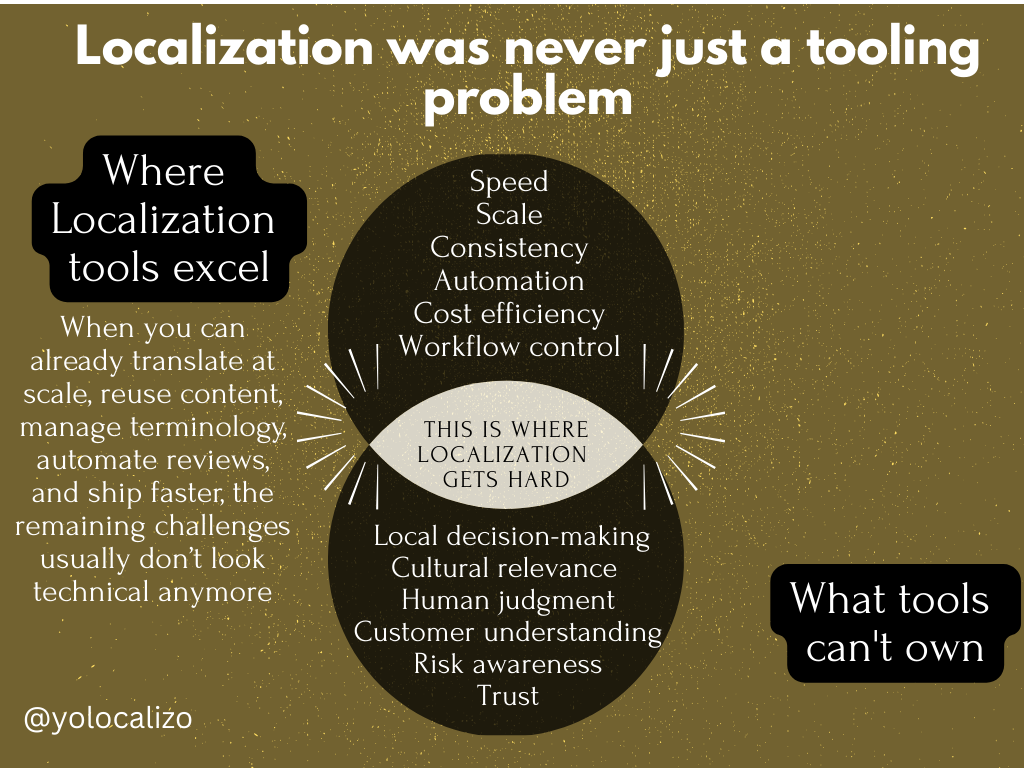
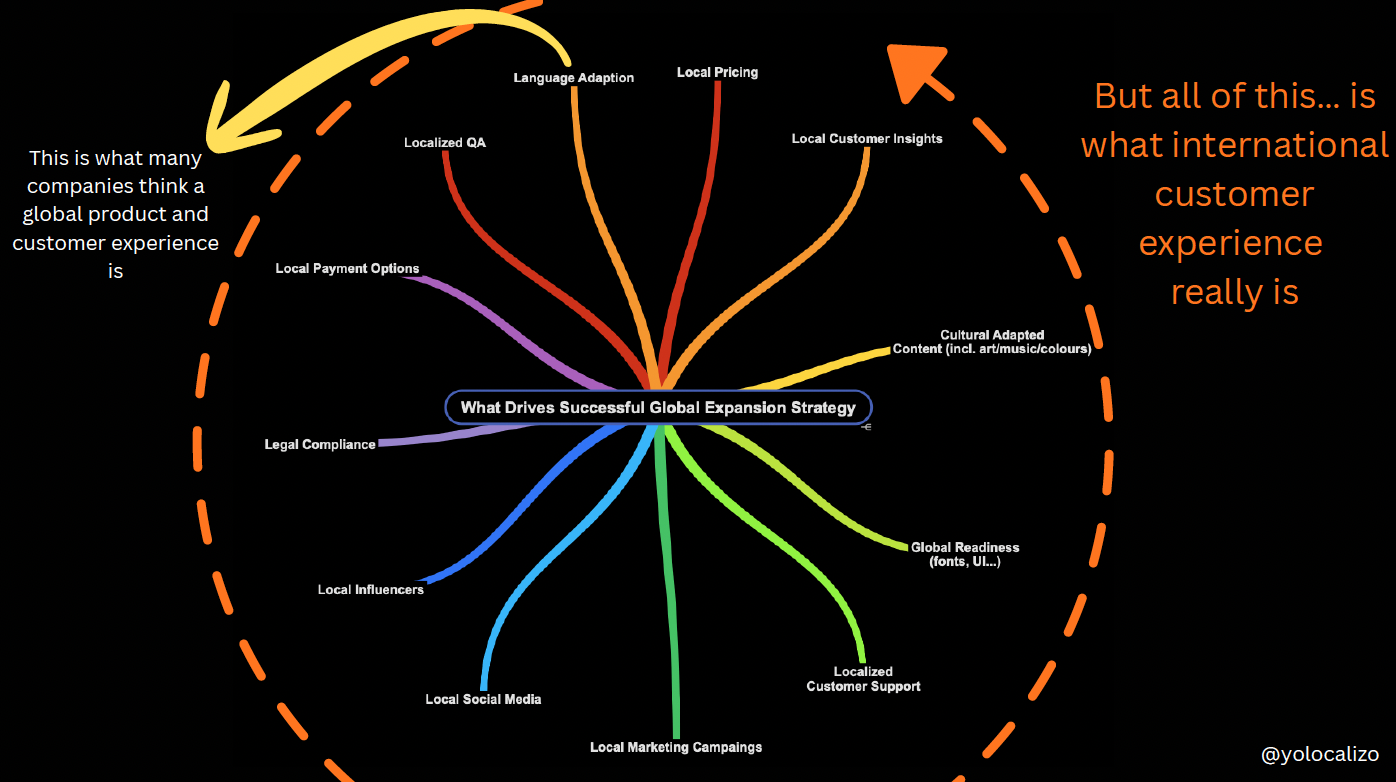
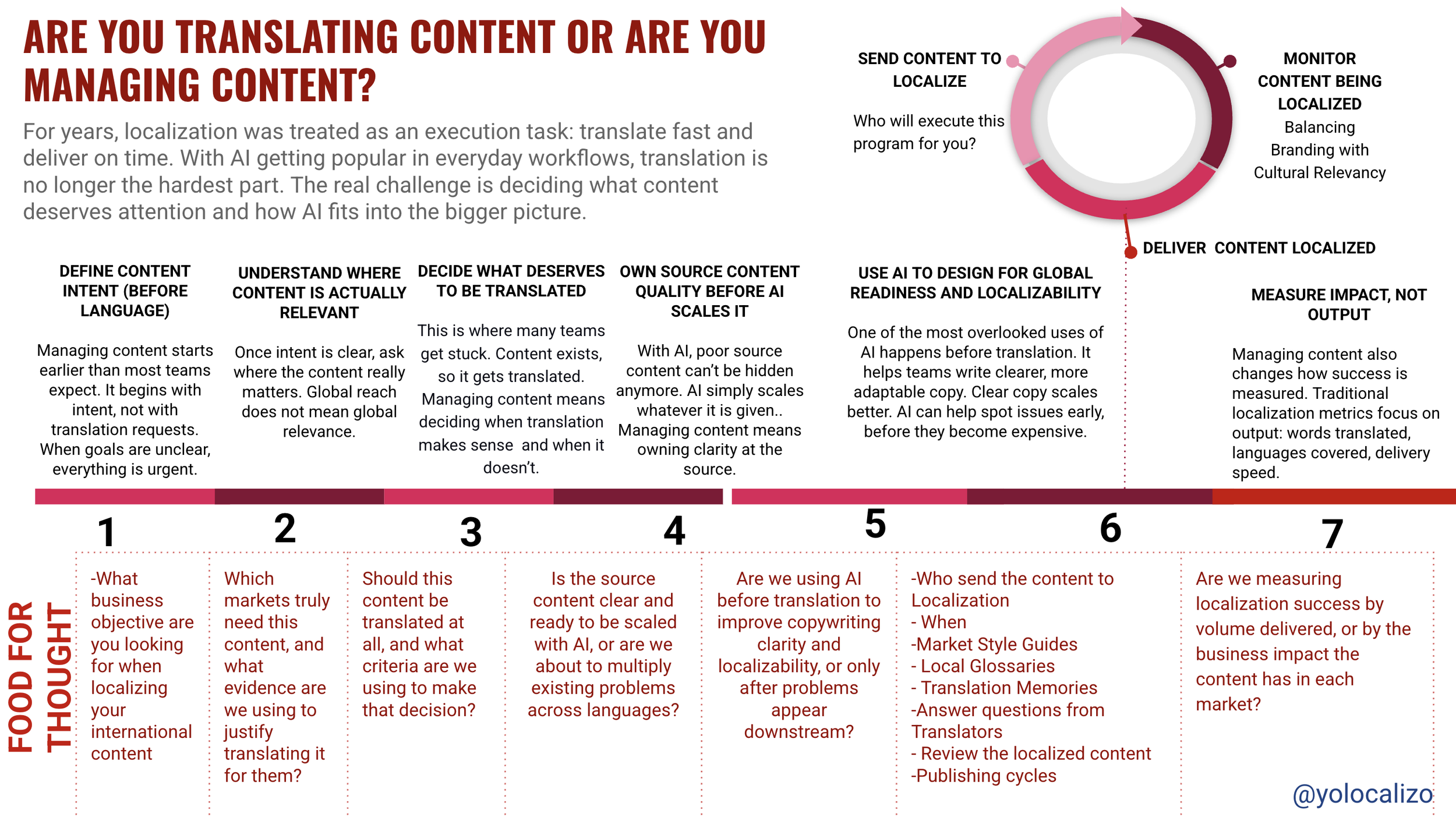

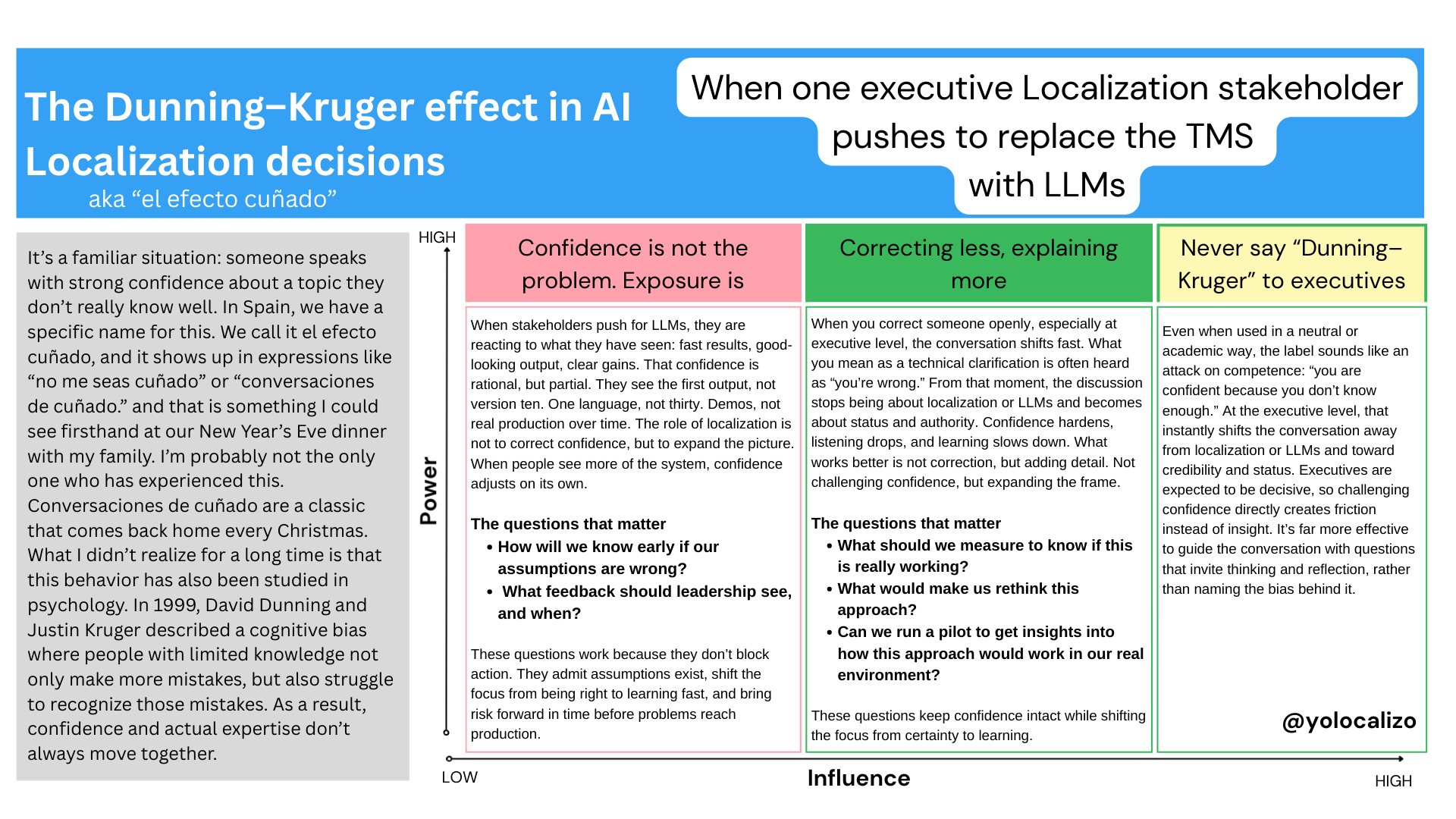


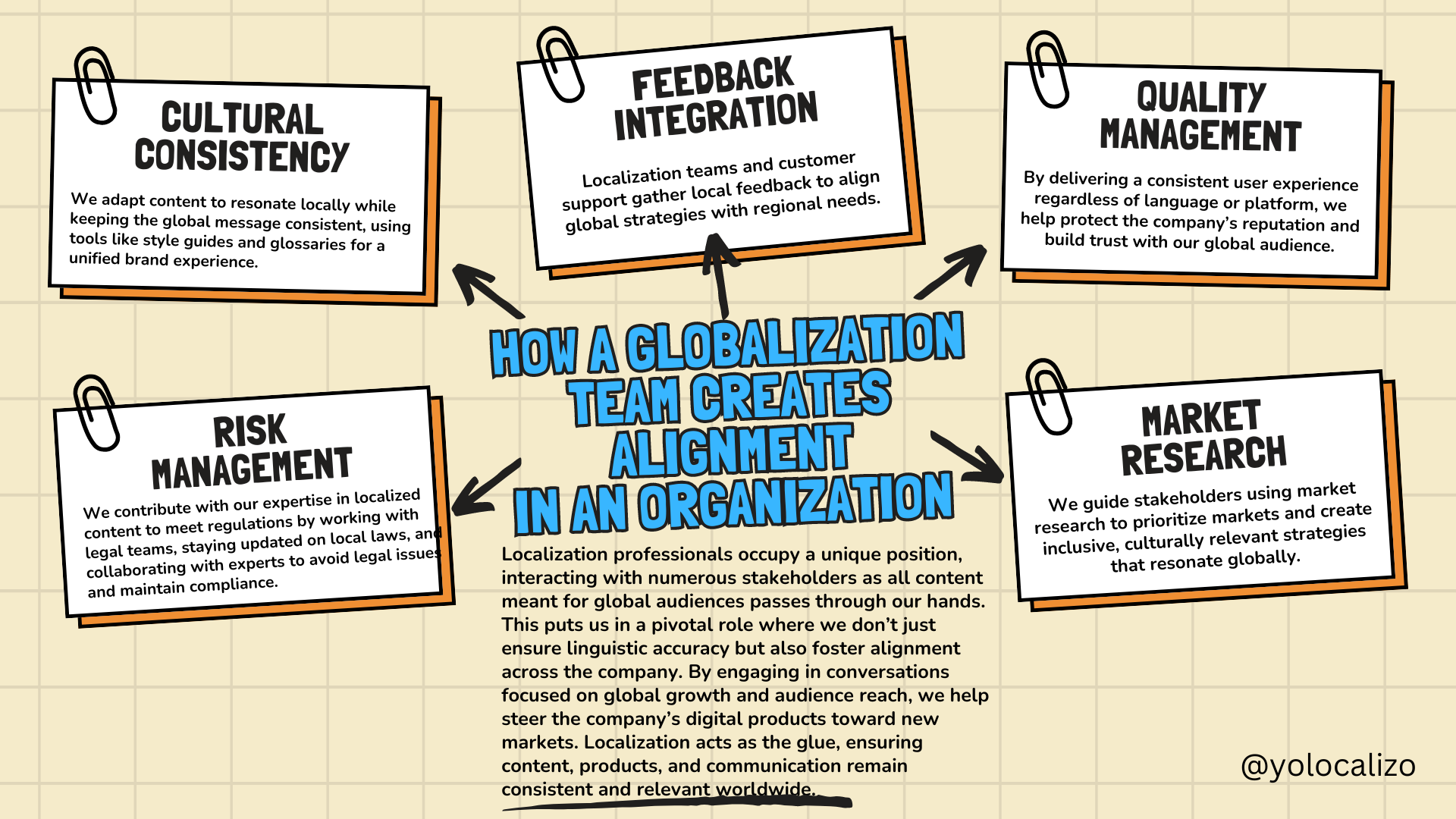








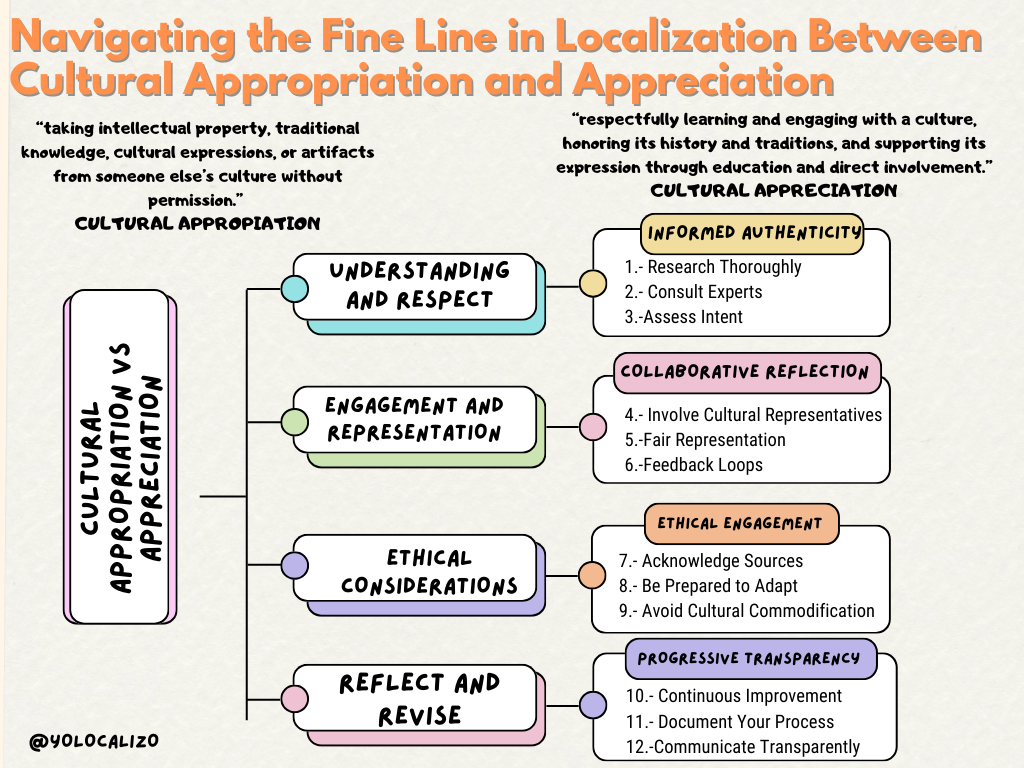

The world of localization is full of small, hidden details.
Some things are deeper than they seem, and I often see between in-context review and LQA in the world of Localization. They might seem the same, but if we scratch beneath the surface, we'll see they're not what they seem.
In this post, I want to focus on explaining the differences between in-context review and LQA, which is something I see being confused quite frequently, and although the tasks are similar ... they are not the same.